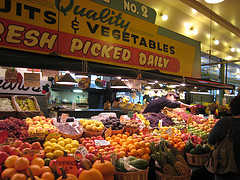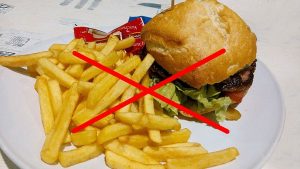
Gone are the days when organic foods were considered niche items and could only be purchased in health/natural food shops. Today, the average consumer can enter any supermarket and have available to them wide ranges of fresh produce, dairy products and packaged foods that are certified organic. The demand has certainly brought about increased supply in this instance, and it’s fair to assume availability will only increase as awareness grows regarding the effects of food that is brought to market via “traditional” methods.
Certified organic foods offer the option to reduce your and your loved ones’ exposure to harmful pesticides and chemicals, but including them in your diet can be wildly expensive. Is it necessary to transition your entire diet to organic foods, or are there certain items that are just as safe non-organic? It’s true that as the gears of supply and demand turn, the price of organic foods has come down, and will surely continue to decrease over the years, but, for the moment they remain more expensive, so arm yourself with some extra knowledge before your next grocery shopping trip in order to keep expenses down.
Always compare prices to find the most budget-friendly items. Often, prices can vary quite a lot from place to place, even in the same city. When shopping for organics, you can’t assume that the larger, more well-known supermarkets and retailers will offer the best prices, so check smaller shops as well.
Practice with new recipes, and work up meal plans around the most affordable items. If you eat meat and dairy, and your grocery budget is modest, then always opt for organic choices, as conventional meats, milk, cheeses, etc. are almost always riddled with hormones and elevated levels of pesticides.
When it comes to produce, try to begin networking with local organic farmers, and deal with them directly; this will almost always save money. Also, buy produce in season whenever possible.
Remember that even when working with a meager food budget, you’re investing in your long term health when you purchase strictly organic in certain foods. Here is a list of the foods that you should be willing to pay extra for due to the greater likelihood that they are contaminated with pesticides:
Apples, Celery, Strawberries, Peaches, Spinach, Nectarines (imported), Grapes (imported), Sweet bell peppers, Potatoes, Blueberries (domestic), Lettuce, Kale/Collard greens.
On the other end of the spectrum, there are foods which are, for the most part, safe to purchase non-organic:
Onions, Sweet corn, Pineapple, Avocado, Asparagus, Sweet peas, Mangoes, Eggplant, Cantaloupe (domestic), Kiwi, Cabbage, Watermelon, Sweet potatoes, Grapefruit, Mushrooms.
When enjoying foods from the second list, take the time to peel those which have edible skins, as well as the outer leaves of items such as cabbage, and always make certain to wash produce thoroughly.
Familiarize yourself with the “Dirty Dozen” guide (above) and type “dirty dozen guide” into your search engine to find a printable version. There is even one available that folds into a handy pocket sized guide to keep in your wallet for quick reference.
This article is by Eleanor McGinnis, a freelance writer for Advance Me Inc., America’s leading provider of the merchant cash advance – an alternative to traditional, collateral based bank loans, for small-medium sized businesses.



When it comes to produce, try to begin networking with local organic farmers, and deal with them directly; this will almost always save money. Also, buy produce in season whenever possible.
Eating organic foods can get really pricey, but if you can plant your own veggies in your backyard that will save you a lot of money. You are also assured that your produce are chemical-free.